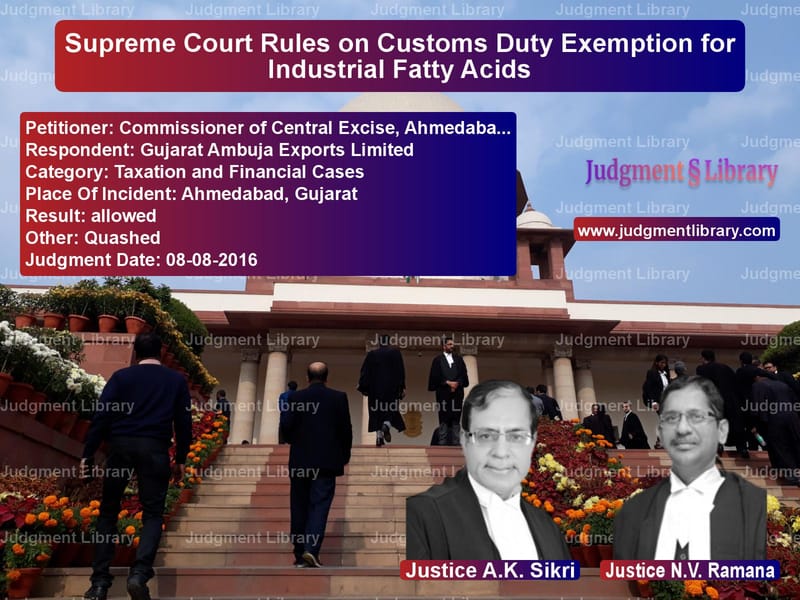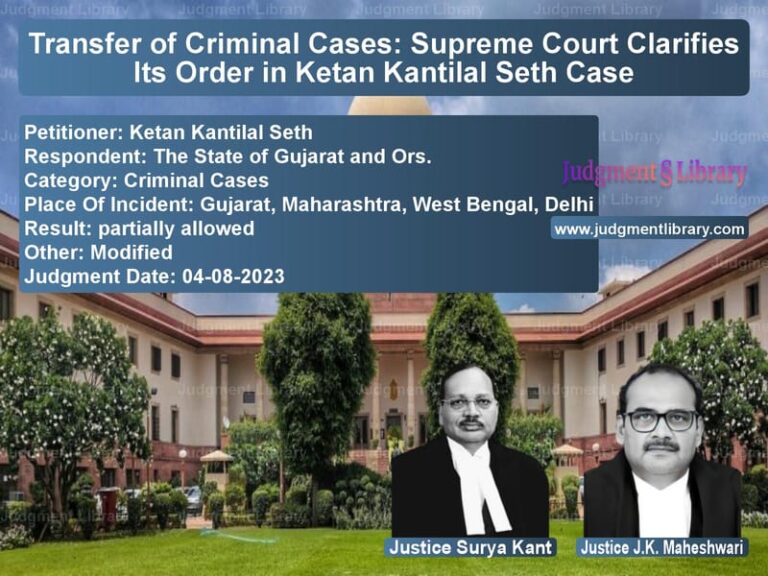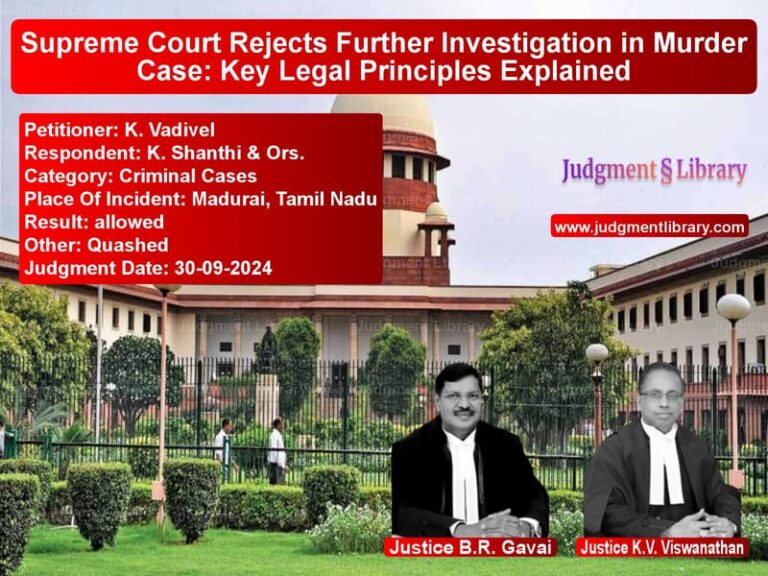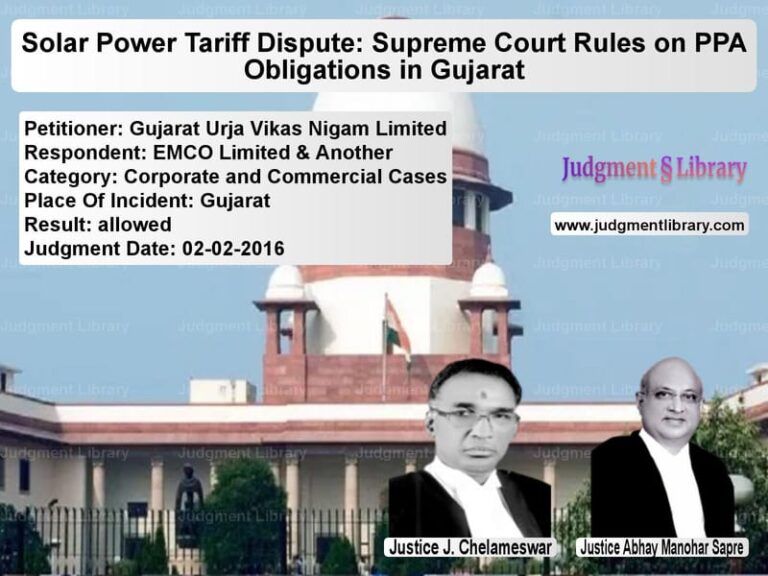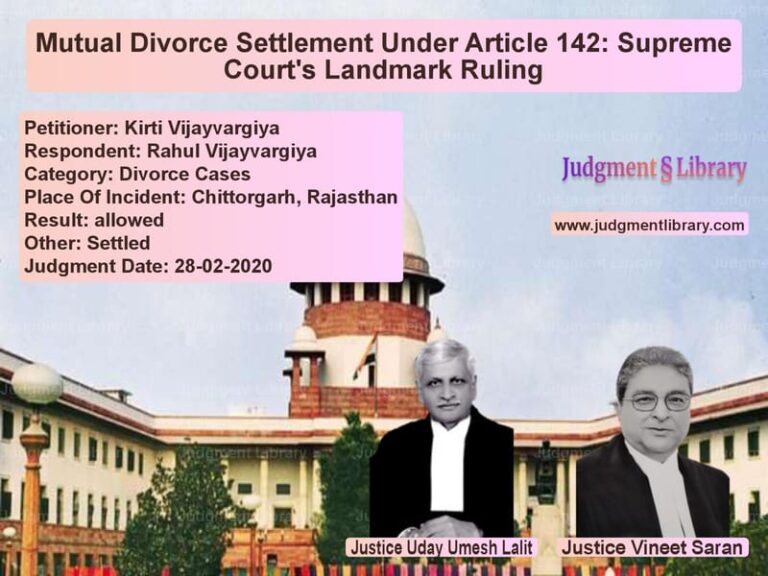Supreme Court Rules on Customs Duty Exemption for Industrial Fatty Acids
The case of Commissioner of Central Excise, Ahmedabad v. Gujarat Ambuja Exports Limited revolved around whether the respondent was entitled to claim the benefit of customs duty exemption under Notification No. 21/2002-Cus dated 01.03.2002 read with Notification No. 66/2004-Cus dated 09.07.2004. The Supreme Court, in its judgment dated August 8, 2016, ruled in favor of the Revenue, stating that the conditions of the exemption notification were not met.
Background of the Case
The respondent, Gujarat Ambuja Exports Limited, is engaged in the manufacture of refined edible oil, Vanaspati, cotton yarn, starch, cattle feed, and wheat flour. The dispute arose when the company imported crude palm oil (non-edible grade) under concessional customs duty, claiming that it would be used for the manufacture of Industrial Fatty Acid as specified in the exemption notification. However, the Revenue contested this claim, stating that the imported crude palm oil was being used for refining edible oil instead.
Legal Issues
The Supreme Court was required to examine:
- Whether the respondent fulfilled the conditions of the exemption notification.
- Whether Palm Fatty Acid Distillate (PFAD) manufactured by the respondent qualified as Industrial Fatty Acid.
- Whether the imported crude palm oil was actually being used in the manufacture of Industrial Fatty Acid.
- Whether the demand for customs duty and the penalty imposed were justified.
Petitioner’s Arguments (Commissioner of Central Excise)
The Revenue contended:
- The respondent was refining crude palm oil for edible use rather than manufacturing Industrial Fatty Acid.
- The test reports and expert opinions confirmed that PFAD was a by-product and not Industrial Fatty Acid.
- The imported crude palm oil was predominantly used for refining edible oil, which did not meet the conditions of the exemption notification.
- The company lacked facilities for saponification and fat splitting, which are essential processes for producing Industrial Fatty Acid.
Respondent’s Arguments (Gujarat Ambuja Exports Limited)
The company argued:
- PFAD is recognized as Industrial Fatty Acid under trade and chemical classifications.
- The exemption notification did not specify a minimum yield requirement for Industrial Fatty Acid.
- The company had followed the procedure under the Customs (Import of Goods at Concessional Rate of Duty for Manufacture of Excisable Goods) Rules, 1996.
- The show cause notice was time-barred since the demand was raised much after the import took place.
Supreme Court’s Observations and Ruling
1. PFAD Does Not Qualify as Industrial Fatty Acid
The Court examined expert opinions and concluded:
“The product called ‘Palm Fatty Acid Distillate’ emerges as a by-product in the refining process. However, in technical and trade parlance, it cannot be equated with Industrial Fatty Acid.”
The Court emphasized that merely because PFAD has high free fatty acid content does not mean it qualifies as Industrial Fatty Acid under the exemption notification.
2. Imported Crude Palm Oil Was Used for Edible Oil Refining
The Court found that the imported crude palm oil was primarily used to manufacture refined edible oil and Vanaspati:
“When the notification lays down the condition that the crude palm oil must be used for the manufacture of Industrial Fatty Acid, it means that its use must be substantive and not incidental or nominal.”
The Court noted that only about 25% of the imported crude palm oil resulted in PFAD, whereas 70% was converted into refined palm oil, making the primary purpose edible oil refining.
3. Exemption Notifications Must Be Strictly Construed
The Court reaffirmed the principle that tax exemptions must be interpreted strictly:
“The focus of the Tribunal should have been as to whether the assessee has fulfilled the conditions of the exemption notification rather than relying solely on HSN Explanatory Notes.”
The Court held that the Tribunal erred in relying on trade classifications rather than considering the actual usage of the imported crude palm oil.
4. Demand for Customs Duty and Penalty Was Justified
The Court upheld the Revenue’s claim for customs duty and penalty:
“The show cause notice was issued within a reasonable period after it was discovered that the assessee was using crude palm oil for refining edible oil rather than for manufacturing Industrial Fatty Acid.”
The Court ruled that the demand was not time-barred, as the Revenue had acted upon new intelligence findings.
Final Verdict
The Supreme Court allowed the appeal and ruled:
- The Tribunal’s decision in favor of the respondent was set aside.
- The exemption claim under Notification No. 21/2002-Cus was rejected.
- The customs duty demand of Rs. 7,89,89,868 was upheld.
- Interest under Section 28AB of the Customs Act, 1962, was applicable.
- Penalty under Section 112/114A of the Act was justified.
Key Takeaways
- Strict compliance with exemption notifications is necessary for claiming customs duty benefits.
- By-products of a process cannot be equated with the primary intended product for exemption claims.
- The burden of proof lies on the importer to show that the imported goods meet the exemption conditions.
- The Revenue can issue demands based on later discoveries, and such demands are not automatically time-barred.
Impact of the Judgment
The ruling had significant implications for customs duty exemptions and industrial classifications:
- It reinforced that tax exemptions must be interpreted strictly and cannot be claimed based on incidental by-products.
- It clarified that importers must prove actual compliance with exemption conditions, not just rely on chemical classifications.
- It upheld the power of Revenue authorities to reassess imports based on new findings and impose penalties for misrepresentations.
In conclusion, the Supreme Court’s decision in Commissioner of Central Excise v. Gujarat Ambuja Exports Limited set an important precedent in customs law by ensuring that tax benefits are granted only when the specified conditions are met. The ruling strengthened the legal framework for import duties and provided clarity on the classification of industrial by-products under exemption notifications.
Don’t miss out on the full details! Download the complete judgment in PDF format below and gain valuable insights instantly!
Download Judgment: Commissioner of Cent vs Gujarat Ambuja Expor Supreme Court of India Judgment Dated 08-08-2016-1741878457773.pdf
Direct Downlaod Judgment: Direct downlaod this Judgment
See all petitions in Customs and Excise
See all petitions in Judgment by A.K. Sikri
See all petitions in Judgment by N.V. Ramana
See all petitions in allowed
See all petitions in Quashed
See all petitions in supreme court of India judgments August 2016
See all petitions in 2016 judgments
See all posts in Taxation and Financial Cases Category
See all allowed petitions in Taxation and Financial Cases Category
See all Dismissed petitions in Taxation and Financial Cases Category
See all partially allowed petitions in Taxation and Financial Cases Category

